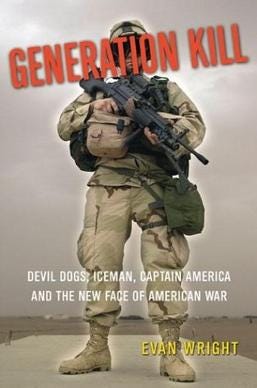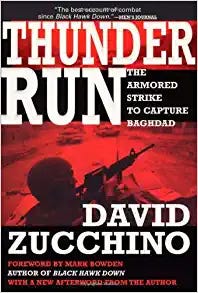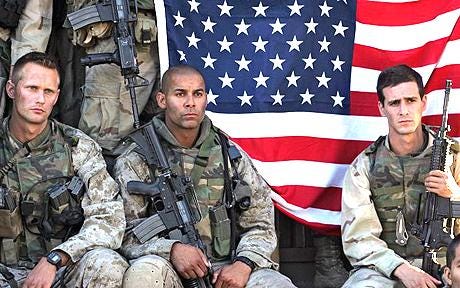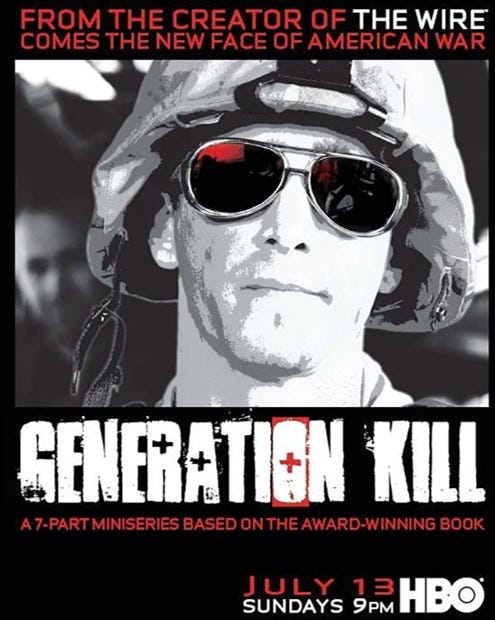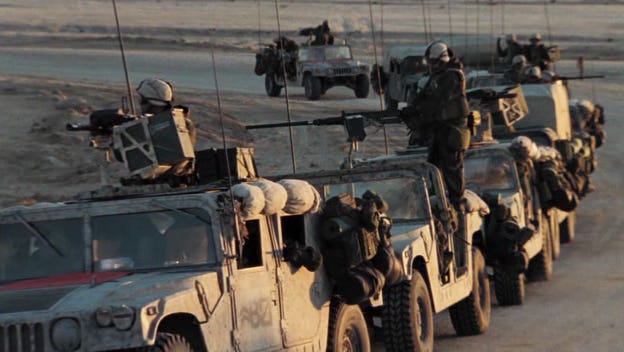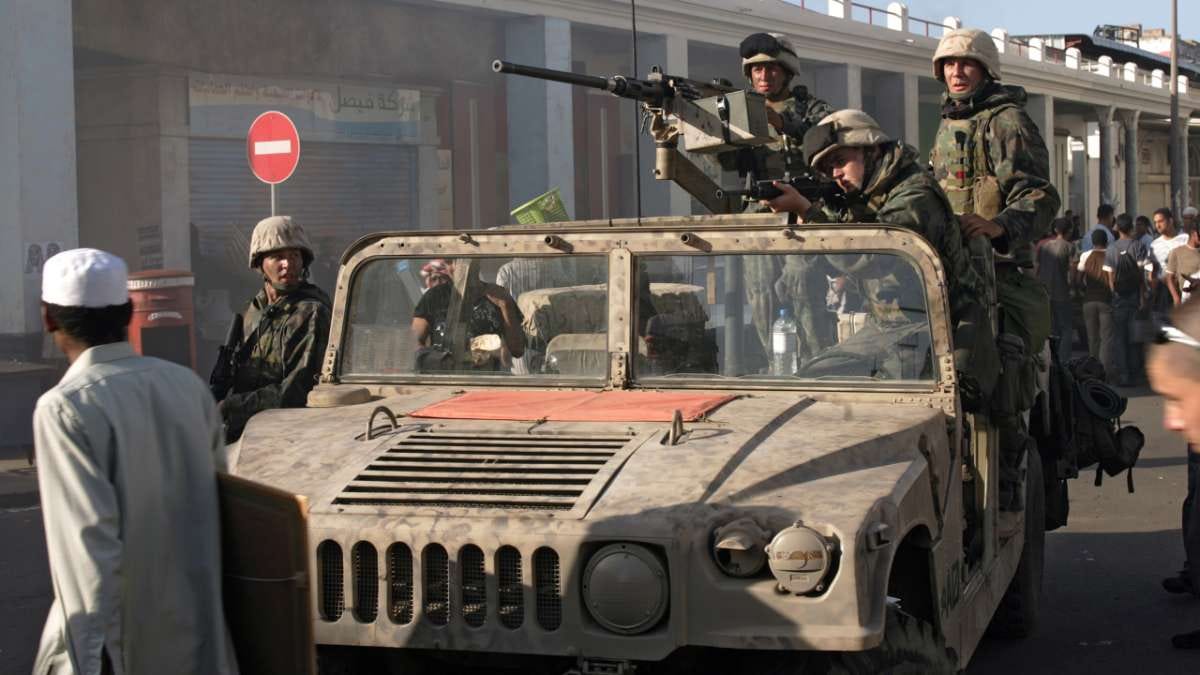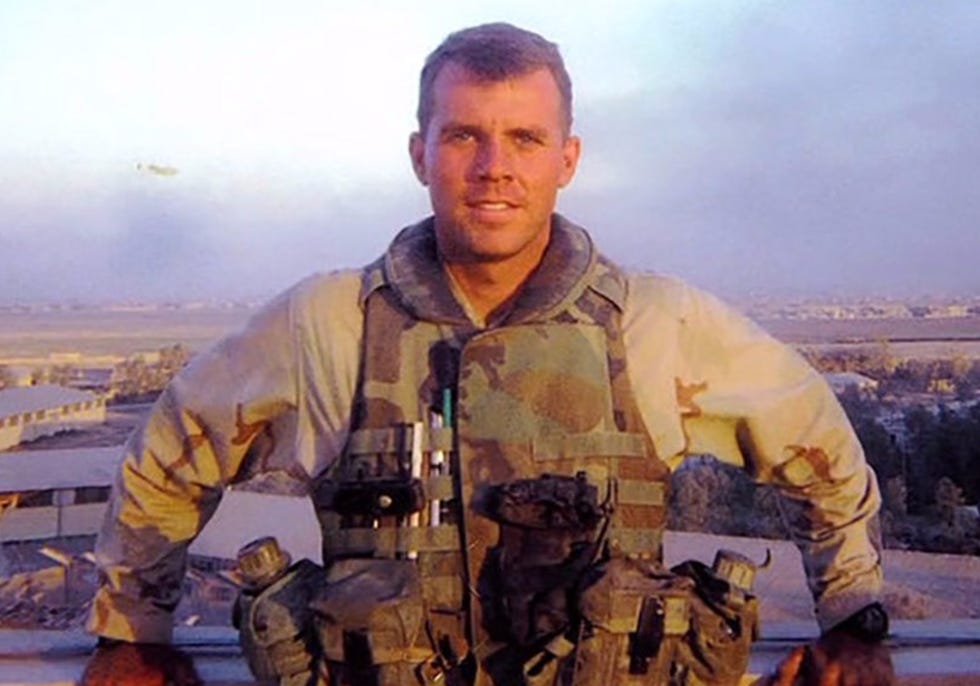Book Review: Generation Kill by Evan Wright
Wright's account is a personality-driven and insightful look at the Iraq War from the Marine grunt's perspective.
Reader Warning: This post has strong language and graphic descriptions of violence.
"The Marines are like America's little pit bull," Corporal Person said. "They beat it, starve it, mistreat it, and once in a while, they let it out to attack somebody. That's what we're about to do to Iraq."- Evan Wright, Generation Kill: Devil Dogs, Iceman, Captain America, and the New Face of American War
Tip of the Spear
Generation Kill is a book by Evan Wright, and HBO Films later made it into a seven-part miniseries. The first-hand narrative account of the young Marines of Second Platoon, Bravo Company, First Reconnaissance Battalion- the Marine Corps' special operations unit whose motto is "Swift, Silent, Deadly" – was the "tip of the spear" for 2003 the American-led invasion of Iraq.
Wright first wrote about that experience in a three-part series in Rolling Stone. Critics hailed the article for its evocative, accurate war reporting. Later, his 2004 book, a greatly expanded version of that series, matches its accomplishment.
Wright is a perspective reporter. His account is a personality-driven and insightful look at the Iraq War from the Marine grunt's perspective: the platoon commanders and non-commissioned officers who led the way to Baghdad. It jibes with other first-hand reports of the first phase of the Iraqi invasion (including David Zucchino's Thunder Run).
The miniseries depicts actual events from the book. The show's writers used real names. As much as possible, the miniseries tries to employ the precise dialogue reported by Wright. The filmmakers made every effort to recreate Wright's account of the Bravo-Two Marines, from their weeks of training in Kuwait to crossing the border into Iraq, all the way to weeks later in Baghdad's slums.
The Book
The most prominently-featured Marines in the book follow 2nd Platoon: Sergeant Brad "Iceman" Colbert, Lance Corporal Harold James Trombley, Sergeant Rudy "Fruity" Reyes, First Lieutenant Nathaniel Fick, and Corporal Josh Ray "Whiskey Tango" Person. Wright, an embedded journalist, spent seven weeks riding in the battalion's lead vehicle's back seat in a lightly-armored Humvee commanded by Colbert. The author wrote that by braving the dangers of war, the initially-suspicious Marines slowly dropped their guard and came to trust him to tell their stories.
The earliest parts of the book involve boring descriptions of the day-to-day lives of the Marines living in tents in Kuwait, waiting to attack across the border into Iraq. These passages provide crucial context later when Wright entered the Marines' heads.
Warrior Mindset
On the surface, the Marine grunts behave with a sense of crude camaraderie, casually and affectionately referring to one another as "motherfuckers" and racial epithets. Moreover, Wright's early descriptions of the Recon Marines are primarily generalizations. He describes them as "raised by absentee, single, working parents. Many are on more intimate terms with video games, reality TV shows, and Internet porn than they are with their own parents." Wright observes the lack of political aspects of why the Marines are fighting in Iraq in their personalities and perspectives.
For Wright, attitudes to the war on his imagined Homefront are profoundly political and held with varying degrees of nuance. But for the deployed Marines, their perspectives are quite different. Despite being on the frontlines of a deeply politically polarizing war, the Marines are not terribly attuned or even care about the partisan arguments for and against the Iraq invasion. "For some," writes Wright, "slain rapper Tupac is an American patriot whose writings are better known than the speeches of Abraham Lincoln."
Crude Psychology, Dark Humor
As Wright experiences more combat, he begins to grasp the Marines' crude psychology and dark humor, particularly concerning soldiers from other wars. Wright quotes 25-year-old 1st Lt. Nathaniel Fick, the 2nd platoon commander, who appraises his Marines by saying, "Did you see what they did to that town? They fucking destroyed it. These guys have no problem with killing." The author includes other quotations that suggest these soldiers are "killing machines" compared to the young men who fought in World War II.
The author says this idea of being a "killing machine" is most accurately encapsulated by a favorite phrase of the soldiers: "Get some." Highlighting the phrase's implicit sexual aspect, Wright says it is symbolic of "the excitement, the fear, the feelings of power and the erotic-tinged thrill of sex and danger" the Marines feel by doing their job of killing enemy combatants. One of the most chilling passages of the book involves "a recurring and fantastic joke" told around the battalion:
"What's the first thing you feel when you shoot a civilian?"
"The only thing I feel is my rifle's recoil."
Impartial Observer
But despite the vivid depiction of the psychopathic element of fighting in the Iraq War, Wright doesn't judge his subjects. For example, Sergeant Brad Colbert is nicknamed "The Iceman" by his comrades for his ability to "stay frosty" and almost relaxed during horrifying acts of war.
But that relaxed demeanor, far from being evidence of psychopathy, is, in fact, proof of his supreme capabilities and competency as a combat leader- without which, he would jeopardize the survival of his Marines. In these contradictions, Wright best encapsulates the contradictions inherent in modern warfare.
Wright paints a compelling portrait of a handful of Marines, most of whom are young, street-wise, and professional warriors dedicated to the business of killing the enemy. Wright points out the Marines' main problem was sorting out innocent citizens from civilian-clothed enemy fighters. He never shies away from detailing what happens when the fog of war resulted in the deaths and maiming of innocent Iraqi civilians (some of them women and children). He doesn't hesitate to describe intimately the few instances where Marines we get to know are wounded or killed. Fortunately, Wright presents a vivid picture of elite warriors in action on the front lines in the initial invasion of the Iraq War.
Finally, Wright, too, begins to understand first-hand war's strange allures. Before taking the assignment, the author quit drinking. After feeling the adrenaline rush of getting shot at for the first time, Wright says that it felt "almost nice" and that the intensity of trying to survive in a war zone is akin to the "emotional chaos of being a heavy drinker."
The Show
Generation Kill is a seven-episode HBO miniseries. The show is not your typical war movie production. At times you laugh. Other times you feel sad while it addresses the war's complexity and the brotherhood born of combat.
The series faithfully follows Wright's book with the First Recon Battalion through the first forty days of the invasion. The show recounts the good, the bad, and the boring of being in the military, warts and all. We see that American troops lacked everything from proper maps, translators, weapons, and batteries for their night-vision goggles in the initial attack.
Like the viewers, Wright immediately drops in on the Marines, preparing to invade. They initially regard the reporter with suspicion until they learn he once wrote for Hustler magazine.
"The invasion was like a crazy family car trip or a road trip movie," said Wright, who vividly rendered the between the trash-talking driver Cpl. Josh Ray "Whiskey Tango" (the military phonetic spelling of "White Trash") Person and his sarcastic, unflappable team leader Sgt. Brad "Iceman" Colbert and the impatiently bloodthirsty Lance Cpl. James Trombley. "I guess I saw myself as the weird uncle sitting in the back. Instead of fixing flats and picking up girls, we were dodging roadside bombs and driving into enemy ambushes."
An Uncertain Strategy
The brass used the Marines of First Recon as guinea pigs for a blitzkrieg-like strategy. The idea was to make the Iraqi Army off balance by sending Marines deep into enemy territory without secure supply lines, taking prisoners, or holding territory. In reality, this bold tactic took Marines from an elite unit trained to scout on foot and put them in unarmored Humvees. They had trouble distinguishing innocent civilians from deadly insurgents while pushing for mission objectives that were never fully articulated, and they really didn't understand. Actually, Wright explains this experimental strategy by calling it "maneuver warfare."
The war's planners deployed First Recon Battalion like the German Panzer divisions' successful blitzkrieg tactics in World War II. The invaders principally relied on speed, mobility, and firepower to overwhelm the enemy with "shock and awe." The Marine commanders, namely General Jim Mattis, sent the Recon Marines headlong into ambushes, but instead of being in tanks, the Marines were in thin-skinned, open-backed Humvees on purpose.
The battalion's invasion route cut through rugged enemy-held terrain. Along the way, they fought Saddam loyalists, Iraqi regular soldiers, and foreign terrorists from Syria and Egypt, all waiting in ambushes. Disgruntled Iraqi soldiers discarded their uniforms, donned civilian clothing, and melted into small, deadly guerilla units attacking the invading U.S. forces on their way north to the Iraqi capital.
Wright points out that the enemy confronting the Marines sees them not as liberators but as infidel invaders of their Muslim country. Like Vietnam, sorting out the bad guys from innocent civilians under combat stress is not an exact science, especially with continuously changing "rules of engagement." The war changes not just the country they invade but the invaders themselves.
Baghdad
Three weeks later, the Recon Marines finally reached Baghdad. They're initially jubilant with the successful completion of their mission. But soon, they witnessed the lawless killing and looting chaos caused by the American-led invasion.
In Wright's words, this unanticipated outcome quickly drains their euphoria. They begin to see their completed mission as "a Pyrrhic victory for a conquering force ill-trained and unequipped to keep order in the country it occupied."
Unlike the few weeks of pre-invasion practice in blitzkrieg maneuvering the Marines received, they have no training or background in being urban policemen. Wright again quotes Fick, the seasoned 2nd platoon commander, "Our impact on establishing order is about zero. As far as I can see, there's no American plan for occupying and pacifying Baghdad."
Crack Combat Troops
Wright reminds us that Recon Marines are the elite of crack combat troops. They are an all-volunteer unit toughened mentally and physically by rigorous training regimens. They're well-schooled in killing and bolstered by Judeo-Christian religious precepts that justifies killing as moral when done for a righteous cause- such as invading a sovereign nation deemed an "enemy" by the United States.
The Recon Marines understand that wars are won by the side that kills the most enemy troops. At one point, the Marines get strafed from both sides of a village street. Miraculously, the Devil Dogs suffered no casualties. They suppressed the enemy's hostile fire with their overwhelming firepower that was awesome enough to ventilate a building with so many bullet holes that the structure's walls collapsed.
After surviving the ambush, the Marines are relieved, even giddy. Ever conscious of the cultural nuances that produced this generation, Wright writes: "Howling and laughing, they almost seem like Johnny Knoxville's posse of suburban white homies celebrating one of his more outrageously pointless 'Jackass' stunts."
Changing ROE
Wright chronicles the hardening of young Marine warriors in combat for the first time. The confusing and constantly changing rules of engagement (ROE) eventually cause all Iraqis to become "potential hostiles." Now, the Marines were authorized to kill the very people they went to Iraq to "liberate." This confusion causes one Marine to question whether his combat actions are justified and if a Christian God could ever forgive him. A few Marines were troubled enough by this complexity to approach Navy Chaplains with questions about sin and forgiveness.
Wright's verdict is clear: American neo-con politicians knew how to start the war. Embarrassingly, by the time the elite First Reconnaissance Battalion reached Baghdad, the same neo-con politicians had not planned an endgame strategy for the war they started. Beyond some vacuous maxims about spreading democracy in a multicultural nation, these same inept planners hadn't bothered to study or understand Iraq's culture or history. The result was a country in chaos and on the brink of civil war, all caused by America's invasion of Iraq.
Outcome
Sadly, five years later, when the series finally emerged in late 2008, American troops continued to be victims of roadside bombs and ambushes. Just as tragic, the mounting list of American casualties was the continuing "collateral damage" consisting of Iraqi civilians caught in the crossfire of indiscriminate insurgent attacks.
Verdict
Although Wright goes into the assignment hoping to unearth some broad thesis about America's geopolitical role in the Iraq War conflict, he comes out of it with a unique and indispensable perspective on the modern soldier's psychology.
In so many stories, men like these Marines are either chest-thumping heroic warriors bestowing freedom or naïve suckers who volunteered for military service because it was the only job they could find. The truth is Wright's Marines are neither victims nor angels. They were professional warriors sent to do a job most Americans never want to do.
In both the book and miniseries- there's no hand-holding. No character conveniently explains what's going on. It's a raw, gripping war drama. Viewers and readers are left to figure most things out by themselves. Like combat, you can get lost in the graphic war images and the blizzard of military acronyms.
Most veterans love Generation Kill, calling it a non-air-brushed, focus-grouped version of combat. The veteran verdict: Generation Kill was the most realistic depiction of military life and war they've ever seen on film. There can be no higher praise.




